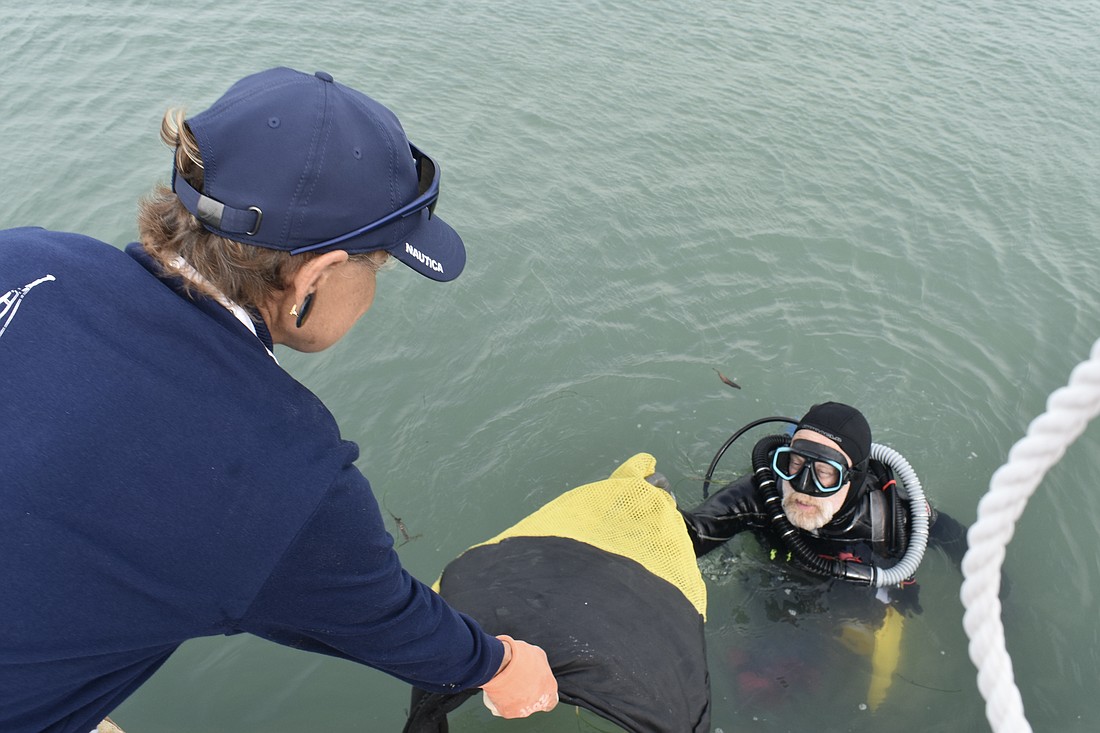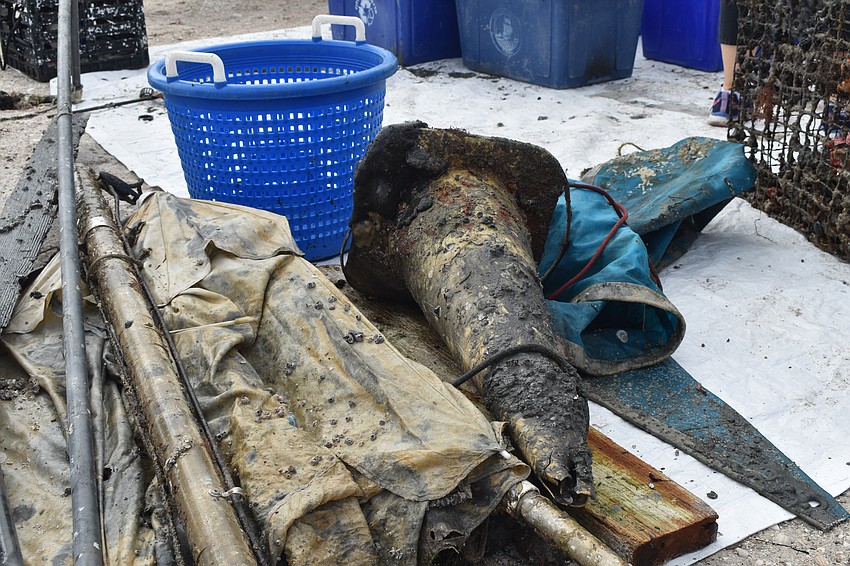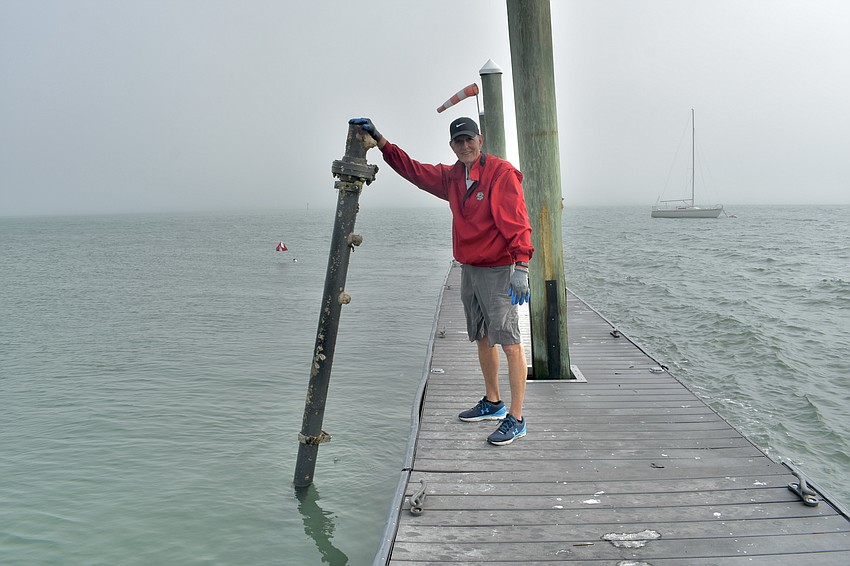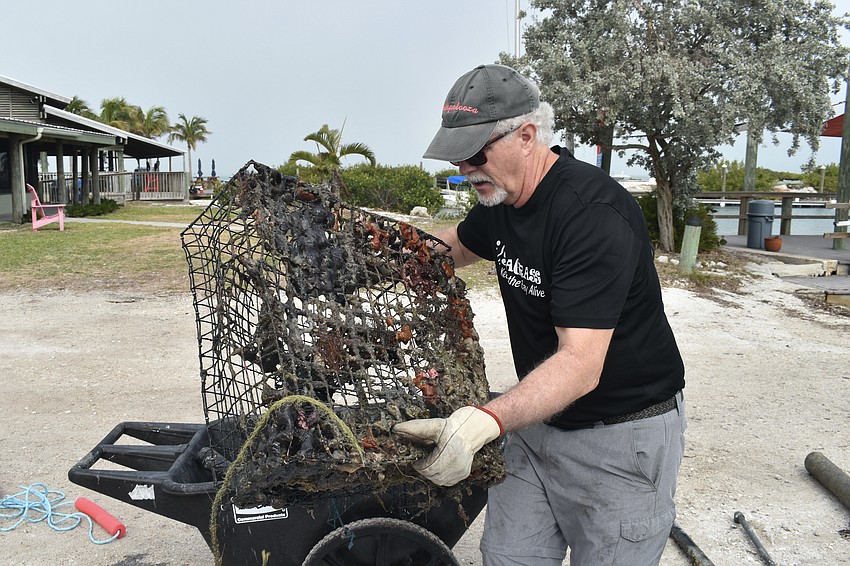- July 26, 2024
-
-
Loading

Loading

Beneath the waves in places like Sarasota Bay, visibility can be limited to about a foot.
That’s why many people may not be aware of the hazards that lie beneath.
Boats. Fishing nets. Crab traps. A park bench.
Those have been some of the finds beneath the bay for Suncoast Reef Rovers, an organization helping to clean beneath the waters of Sarasota County.
“What’s really crazy about this is that we look out across this beautiful view, and you don’t see the amount of trash that’s under the water,” said Rick McNamara, a member of the nonprofit's board of directors. “Unfortunately, out of sight, out of mind. People, frankly, once they see it, can’t believe the volume of what comes out of the water.”
The Venice-based organization is relatively new to the scene of nonprofits focused on keeping the bays clean, having received its nonprofit designation in June 2023.
It partners with organizations that also perform cleanups in the bay, like Sarasota Bay Watch, Suncoast Aquaventures, Sarasota Bay Estuary Program and more.
When McNamara joined the organization in 2019, after retiring from the U.S. Navy and a career in engineering, he began inquiring as to why it was considered a club rather than a nonprofit.
The origins of the organization date to 1997, when it began as a diving social club that revolved around diving and dining. It quickly transitioned into an environmental effort cleaning garbage out of areas like the north and south jetty and the Venice pier area.
McNamara began pushing for the organization’s federal designation, as he thinks the work it performs, both near the shores and at reefs, is a great service to the community.
As McNamara said, “It’s really not fun.”
What does motivate him to dive isn’t the experience in the water, but the large pile the divers help create onshore.

The 5,000-watt light McNamara was wearing on Feb. 12, while diving just offshore from the Sarasota Sailing Squadron, provided very little visibility — just about a foot.
Furthermore, currents can be strong, and some of the objects divers are seeking can be hazardous. If they became entangled, divers would have to use the knives they carry to free themselves.
Many of the objects they seek can even be buried beneath the sand.
“It's not like you're just going in there picking something up and putting it back; it's hard work; you’re digging stuff out, you're using lift bags,” he said.
Lift bags are balloons that can lift an object to the surface. The bags the organization uses can raise 100 to 150 pounds. Once on the surface, the lift bags, which will be neutrally buoyant and weightless, can be pulled by a kayaker or swimmer.
McNamara has been diving since 1981 and said the group probably has around 250 years worth of diving experience among them. Nonetheless, they are always reevaluating their safety procedures after each event.
This has resulted in the current check-in and check-out system, which has divers taking a numbered tag from a board before they head into the water, meaning the group can monitor exactly who is in the water and who has returned.
The group finds what McNamara said are “the craziest of items” that you wouldn’t expect anyone to just discard.
There have been air conditioning units, batteries, and even a gun found 10 to 15 years ago, as well as, recently, an 8.5-foot-long park bench off the John Ringling Causeway. During the cleanup on Feb. 12, the group pulled what appeared to be a boat mast from the water.

Objects like a mast can pose a navigational hazard, McNamara said. It could rip an engine from a boat, worsening environmental problems by spilling oil into the water.
In many places the group cleans up, about 30% of the objects that are removed are hand-cast fishing nets. These perform what is called “ghost fishing,” continuing to catch fish even after they are on the bottom of the bay.
Not only is this a problem from an environmental standpoint, he said, but the nets also contain lead. The group will help the lead to be recycled in order to be turned into dive weights, or used for fishing.
Another find in the oceans, especially after a storm, is crab traps that have broken loose from their lines. The group has formed an agreement with the Florida Fish and Wildlife Conservation Commission that returns these traps to their original owners, based on their numbered tags.
Items like plastic crab traps and PVC piping can leach petrochemicals into waters.
“We're starting to wake up as a community to figure out that plastic has a big impact on our community and our ecosystems,” McNamara said.
The group is also conscious of the possibility that a crime scene could be found. If this occurs, divers are told to surface immediately. Marker bags must be used, and the police must be contacted.
This isn’t something that McNamara has ever encountered, though.
The work appears to be paying off; last year, the group removed over 10,000 pounds of debris from the water.
They don't keep the environment healthier through their own efforts alone; they also partner with other organizations like Sarasota Bay Watch, Keep Manatee Beautiful, Suncoast Aquaventures, the Sarasota Police Department and the police departments in Venice.
“It’s great. We couldn’t do it without the partnership, because it’s the same people who help with each organization’s events,” said Cheryl Huntsinger of Suncoast Aquaventures. “We help Reef Rovers out; they help us out.”
Divers have come from as far away as Orlando and south of Fort Myers.
The organization is entirely staffed by volunteers, with no paid members. There is no building serving as a base of operations, although McNamara said he hopes to keep the group away from a corporate structure, in order to retain its effectiveness.
Kids as young as 8 years old will help shuttle garbage from the water, while even a man and woman, who are both over 80 and disabled, have helped fill roles. Divers vary in their levels of experience.

“It’s starting to get a little overwhelming because the need is so great for getting stuff that's not readily accessible, and it does require some specialized skills,” McNamara said.
Volunteers aren't deterred by the lack of visibility in the water.
Reagan Dehn, a student at New College of Florida, said the organization gave her an opportunity to start diving, something she has always wanted to do since growing up in Topeka, Kansas.
She became certified about 8 months ago, and said the murkiness of the water doesn’t bother her.
“I went on my first dive, and I’ve been diving ever since,” she said. “I love it. It’s great. I love seeing all the wildlife.”